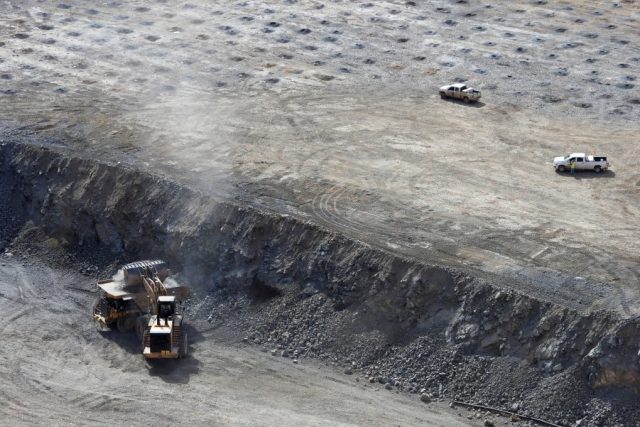The United States announced the establishment of a minerals-security finance network with its allies on Monday, the latest step in its bid to halt China’s global dominance of critical minerals.
The network was the latest initiative out of the Minerals Security Partnership (MSP), a framework the US set up with 13 countries and the European Commission in 2022. It aims to diversify the countries’ supply chains for critical minerals amid an intensifying US-China tech rivalry. The US also rolled out a chip ban against China in 2022.
Its unveiling came as leaders of the Quadrilateral Security Dialogue, or Quad, pledged during a weekend summit in Delaware to “focus near-term efforts” on boosting mineral production across their countries.
China produces nearly two-thirds of the world’s rare earth metals and has imposed export controls on minerals such as graphite and gallium that are critical for making semiconductors and electric vehicles.
Beijing’s actions came in response to Washington’s ramped-up chip restrictions as the two economic giants increasingly face off over technology.
Those taking part in the MSP include banking and mining institutions from Australia, another top producer of critical minerals, as well as from Japan and South Korea, which together have undertaken talks with the US to curb their chip exports to China.
“Partners emphasised that the scope and scale of meeting the rapidly increasing global demand for critical minerals to achieve the clean-energy transition is beyond the purview of any single institution,” the US State Department said in a statement.
“Creation of the MSP finance network reflects a desire to strengthen information sharing, coordination and collaboration among the network participants,” it added.
Addressing the MSP finance meeting in New York on Monday, Jose Fernandez, the State Department’s undersecretary for economic growth, energy and the environment, described the energy transition as “at risk”.
“Many of the supply chains for critical minerals are concentrated in one or two countries and also lack resilience,” said Fernandez.
“Addressing this challenge requires close coordination between partners and allies, countries with public finance, tools, minerals producing countries and the private sector.”
The MSP partnership was announced on the sidelines of the ongoing United Nations General Assembly in New York, where US President Joe Biden and Chinese Foreign Minister Wang Yi are due to speak this week.
Sino-American competition over critical minerals has increasingly extended to other resource-rich regions in the world, including Africa, a traditional mineral supplier for China that has received large amounts of Chinese funding over the years.
In August, the US International Development Finance Corporation voiced interest in funding the Kabanga Nickel Project in Tanzania, a move widely perceived as trying to stem China’s and Indonesia’s dominance of nickel.
American efforts have entailed further investment in Canada. Toronto-based mining company Electra Battery Materials received US$20 million from the US Defence Department in August to support the construction and commissioning of North America’s first cobalt sulphate refinery. Cobalt is a key component for EV batteries.
And as China and the European Union stay locked in a dispute over EV tariffs, the bloc has sought to bolster the resilience of its local supply chains.
The European Bank for Reconstruction and Development (EBRD), described by the US as a “like-minded” MSP partner, has funded a lithium-tin deposit in the Czech town of Cinovec. It is the largest hard-rock lithium deposit in Europe and one of the world’s largest undeveloped tin resources.
The EBRD also provided a US$50 million loan to finance decarbonisation and electrification of mining operations in Turkey, which discovered the world’s second-largest rare earth element reserve, according to the US State Department.
Turkey is reportedly looking for Chinese investments to build infrastructure around the reserve in its northwestern city of Eskisehir.
Ankara is expected in October to dispatch Alparslan Bayraktar, the country’s energy and natural resources minister, to Beijing to discuss a deal, according to news website Middle East Eye, citing sources familiar with the situation.
A US State Department spokesperson last week told the Middle East Eye that Turkey had joined the MSP and a formal announcement would come in the following weeks.
Turkey, which in July secured an EV manufacturing plant by Chinese EV manufacturing giant BYD, filed an application earlier this month to join Brics, an emerging economies bloc comprising Brazil, Russia, India, China and South Africa.
The bloc is increasingly regarded as a rival to the Group of Seven major advanced economies consisting of Britain, Canada, France, Germany, Italy, Japan and the US. The EU is also represented within the G7.
*Credit: South China Morning Post











Přijetí hypoteční platby může být nebezpečný pokud
nemáte rádi čekání v dlouhých řadách , vyplnění
vážný formuláře , a odmítnutí úvěru na základě vašeho
úvěrového skóre . Přijímání hypoteční platby může být problematické, pokud nemáte rádi čekání v dlouhých řadách ,
podávání extrémních formulářů , a odmítnutí úvěru na základě vašeho úvěrového skóre
. Přijímání hypoteční platby může být problematické , pokud nemáte
rádi čekání v dlouhých řadách , vyplnění extrémních formulářů a odmítnutí úvěrových rozhodnutí založených na
úvěrových skóre . Nyní můžete svou hypotéku zaplatit rychle a
efektivně v České republice. https://groups.google.com/g/sheasjkdcdjksaksda/c/xI2tWx9w1i0